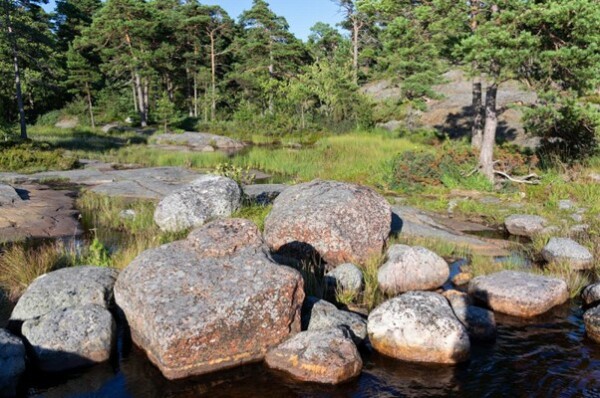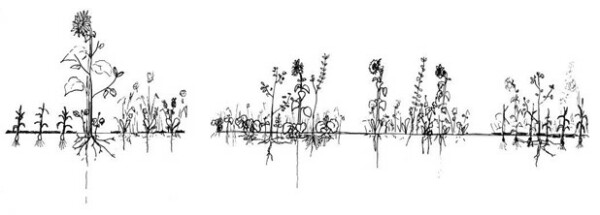Sustainability case: Can farmer supported biodiversity restore farm fertility and profitability?

Sustainability case: Can farmer supported biodiversity restore farm fertility and profitability? The Lill-Nägels Agroforestry Pilot Project aims to find out.
The Lill-Nägels Agroforestry Pilot Project (2022-2023) was being undertaken by Novia University of Applied Sciences in collaboration with Rikard Korkman at his Lill-Nägels farm in Kirkkonummi, Finland. The project is funded by Uusimaa's Centre for Economic Development, Transport, and the Environment (ELY-Keskus), Stiftelsen Finlandssvenska Jordfonden, and Novia UAS.
Department: Bioeconomy
Novia’s project manager: Joshua Finch
What if it were possible for farmers to practice forms of agriculture that improve the environment while providing a viable income for themselves and future generations? Between the groundbreaking work on farms around the world and recent research, it appears that when farming is approached as a primarily ecological undertaking, that this is actually possible. This new trend, often called regenerative agriculture, reframes the task of the farmer to focus on restoring their local ecosystem. The world around us is the result of millions of years worth of coevolution, cooperation, and competition amongst the world’s organisms.
Inspiration from Ecology
At the foundation of earth’s evolutionary story are biodiverse perennial plants growing together as communities. The diversity of plants allows for the sun’s energy to be converted into biology with greater efficiency than if the plants were to grow alone. These plants, in turn, support- and are supported by- diverse communities of life. Evidence of diversity’s necessity is, conveniently, all around us: if a single species were able to fully exploit the sun’s energy, we would see large ecosystems with just one plant species. But the only place we actually see this happening is in agriculture.

Diverse plant communities colonize every conceivable available niche
Biodiversity is the key towards tapping into evolutionary ecological processes which change dirt into soil. Understanding the farm as an ecosystem, or, an agroecology, requires us to think differently. Farming becomes about ensuring that the agroecosystem is capable of producing the things we need over a long period of time. From that point, our actions on the farm are directed towards helping along the processes that are constantly in motion around us already. Bringing back plant biodiversity sets into motion a chain of positive cascading effects.
Agroecology: Biomimicry on the Farm
At the Lill-Nägels Agroforestry Pilot Project we are combining a variety of methods from this concept space with the purpose of exploring how farmers supporting biodiversity can lead to renewed soil fertility and improved crop performance. Much of this diversity will come from copying savannah ecosystems by bringing food producing trees and shrubs back into the fields. By choosing to mimic nature, we include plants which can use the existing conditions while aiding the development of plant communities that can produce more and different kinds of food.

Biodiversity in the tree systems: plants work together in teams to improve conditions for species which follow in space and time
Agroforestry is a promising way for farmers to make a big difference in the whole ecosystem by changing only a small fraction of their land: our project will see about 10% of the field go to trees. Yet, those trees will create things that simply weren’t there before such as fruit, wildlife habitat, a sheltered microclimate for smaller plants, deep root systems which help harvest water from rain and snow, and even make the landscape more visually attractive for people.
With agroforestry and agroecology, we understand that there is no such thing as a single, isolated action. We are inviting local people to support the farm which hosts our project by joining a community supported agriculture program- a direct marketing model which cuts out the middleman and brings customers right into the field. They can support the transition to a biodiverse farming future while eating great at the same time. Our model will hopefully inspire others to bring out the full potential of their farm in their own way.
The blogpost has been reviewed by Novia's editorial board and accepted for publication on 7.2.2024.
![]()
Hållbarhet -Sustainability
I bloggen skriver Yrkeshögskolan Novias personal om hållbarhetsarbetet vid Novia.
Blogginlägg som är granskat av Novias redaktionsråd är utmärkta med nyckelordet "Granskat inlägg - revewed post".
Vi följer CC BY 4.0 om inget annat nämns.
Ansvarsfriskrivning: Författaren/författarna ansvarar för för fakta, möjlig utebliven information och innehållets korrekthet i bloggen. Texterna har genomgått en granskning, men de åsikter som uttrycks är författarens egna och återspeglar inte nödvändigtvis Yrkeshögskolan Novias ståndpunkter.
Disclaimer: The author(s) are responsible for the facts, any possible omissions, and the accuracy of the content in the blog.The texts have undergone a review, however, the opinions expressed are those of the author and do not necessarily reflect the views of Novia University of Applied Sciences.